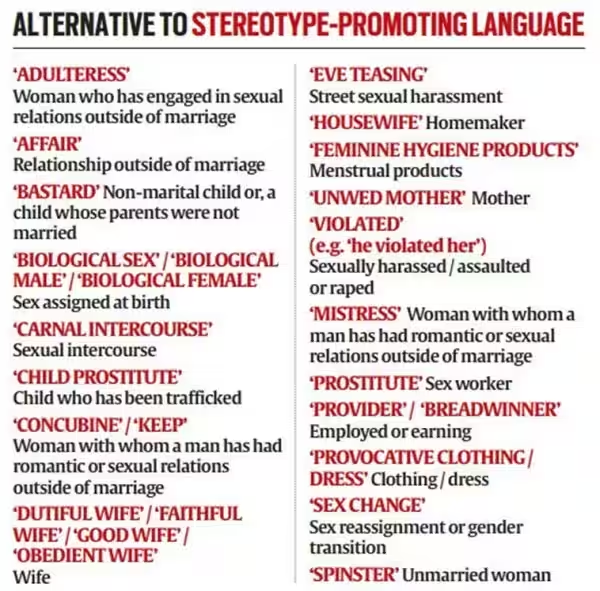Social Justice
SC Handbook on Gender Stereotypes
- 18 Aug 2023
- 5 min read
For Prelims: SC Handbook on Gender Stereotypes, Supreme Court of India, Chief Justice of India, Gender Stereotyping.
For Mains: SC Handbook on Gender Stereotypes, Issue of Gender Stereotyping and its impact on Women In Indian Society.
Why in News?
Recently, the Chief Justice of India (CJI) has released a Handbook, correcting Gender Stereotypes and offering guidance on how to avoid utilising harmful gender stereotypes, in particular those about women, in judicial decision making and writing.
What is the Handbook?
- About:
- The Handbook on Gender Stereotypes is released by the Supreme Court of India with the intention of assisting judges and legal practitioners in recognizing, understanding, and combating gender stereotypes present in legal language and judgments.
- It highlights common stereotypical words and phrases that are often used to describe women in legal documents.
- It points out instances where such language perpetuates antiquated or incorrect notions about women's roles and behavior.
- It also provides specific examples of language that should be replaced with more neutral and accurate terms.
- For instance, it suggests using "woman" instead of "career woman," "street sexual harassment" instead of "eve teasing," and "rape" instead of "forcible rape."
- Objective:
- The handbook aims to promote more equitable and unbiased language usage in judicial discourse.
- The goal of the handbook is to encourage a shift towards language that reflects a more modern and respectful understanding of gender and promotes equal rights for all individuals, regardless of their gender.
Why is it Important for Judges to Use the Right Words?
- The handbook argues that the language a judge uses reflects not only their interpretation of the law, but their perception of society as well.
- Even when the use of stereotypes does not alter the outcome of a case, stereotypical language may reinforce ideas contrary to our constitutional ethos.
- Language is critical to the life of the law. Words are the vehicle through which the values of the law are communicated.
- Words transmit the ultimate intention of the lawmaker or the judge to the nation.
Have there been Similar Efforts in other Countries?
- There have been projects in other countries, pushed by both academia and practitioners, which hold up a mirror for the court’s practices.
- For example, the Women’s Court of Canada, a collective of female lawyers, academics and activists write “shadow judgements” on equality law.
- In India, the Indian Feminist Judgement Project also ‘rewrites’ judgements with a feminist critique.
What is Gender Stereotyping?
- About:
- Gender stereotyping refers to the practice of assigning specific attributes, characteristics, or roles to individuals based solely on their gender.
- These stereotypes can be pervasive in societies and can impact how people perceive and treat each other based on their gender.
- For example, women are supposed to be nurturing and avoid dominance, and men are supposed to be agentic and avoid weakness.
- Impacts of Gender Stereotyping on Women:
- Gender stereotypes act as a barrier for girls to access quality education.
- For example, stereotypes about the role of women as confined to the domestic and family sphere underpin all obstacles to girls’ equal access to quality education.
- Women are often held back from high status positions in society.
- The persistent gender gap in education, employment and wages is due in part to gender stereotyping.
- Harmful gender stereotypes, rigid constructions of femininity and masculinity and stereotyped gender roles are a root cause of gender-based violence against women.
- Gender stereotypes act as a barrier for girls to access quality education.





